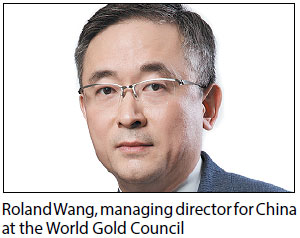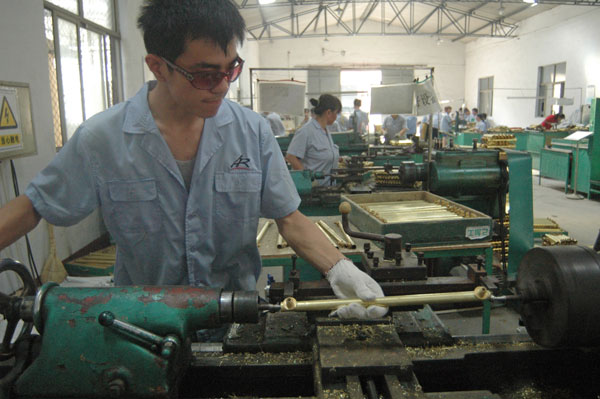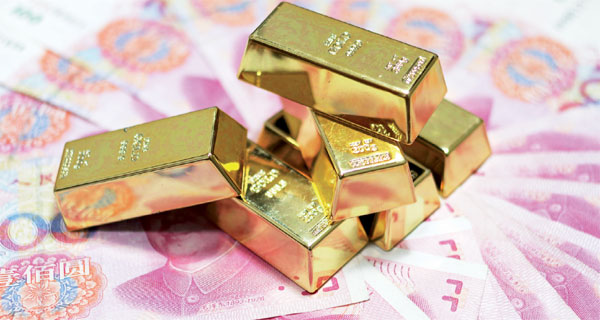China urged to 'take rightful place' in world gold markets
Updated: 2015-08-07 09:22
By Cecily Liu(China Daily Europe)
|
|||||||||||
Growth in the global gold market is shifting from West to East, and China should further liberalize its gold exchanges and allow international participation in order to "take its rightful place" in the world market, says Roland Wang, managing director for China at the World Gold Council.
Wang says the expansion of strong gold trading hubs in Asia will improve price discovery, liquidity, transparency and efficiency, all of which will transform the landscape of the global gold market, and China has a big advantage enabling it to benefit from these trends.
One significant catalyst for China's increasing gold pricing power is the much-talked-about yuan-denominated gold index, expected to be launched by the Shanghai Gold Exchange by the end of 2015.
|
The Shanghai Gold Exchange is to launch the yuan-denominated gold index this year, predicted to increase China's gold pricing power. Photos provided to China Daily |
This new gold index will provide new competition to the London Gold Fix, which is currently the global reference point for the industry, meaning that buyers and sellers of gold would look to the benchmark to determine the exact price of their specific trade.
The Shanghai Gold Exchange was established in 2002 to centralize China's gold trading. It now consists of a Main Board for Chinese traders and an International Board, which is located in the Shanghai Free Trade Zone, which is dedicated to foreign investors.
Currently the Main Board and International Board are separate from each other because the renminbi is not freely convertible and China's capital control means financial trades made by domestic and foreign traders have to be separate in order to help maintain this currency control.
But once the renminbi can be freely converted, the two boards are expected to merge and the SGE will become a significant gold exchange center globally, with Shanghai taking its place as one of the three major international gold exchanges, alongside New York and London, Wang says.
While China is a big consumer of gold globally, it still lacks gold pricing power, and Wang says Chinese banks need to increase their participation in international gold exchanges so that the demand and supply of gold in China can be reflected in gold prices in international markets.
"China's lack of international participation tends to directly impact China's competition for gold price-fixing power," Wang says.

"Only by involving Chinese financial institutions in the global gold fix mechanism, and by advancing renminbi-denominated commodities to encourage foreign investors to conduct business in the China market, can China increase its gold price-fixing power accordingly," he says.
One major milestone in China's participation on international gold exchanges is Bank of China becoming the first Chinese lender to join the London Gold Fix, among seven other banks.
Administrated by the ICE Benchmark Administration Limited, the London Gold Fix is a twice daily electronic auction held in London which determines the benchmark gold price.
Wang says this move by the Bank of China will reinforce the connection between the Chinese and overseas markets, with the international gold price better reflecting supply and demand in China, as well as promoting the internationalization of the Chinese gold market.
"Bank of China's participation in the Gold Fix is the first step for China being the largest gold market in the world, and to become a gold trading center along with London and New York," Wang says.
He says that in the long term China's increasing gold pricing power globally will also fuel the renminbi's internationalization, because the International Board of the SGE will offer a range of renminbi-denominated products for foreign investors to trade, which in turn will lead to increasing liquidity for renminbi internationally.
Historically, China's renminbi was pegged to the dollar but after the financial crisis, extensive quantitative easing by the US has significantly diminished the value of Chinese foreign reserves. China has adopted a policy of gradually opening up its foreign exchange restrictions to help the renminbi become a reserve currency internationally.
Another initiative to help China's participation in international gold trading is the SGE's plan to soon establish the world's largest physical gold fund, the Silk Road Gold Fund, sponsored by Shandong Gold Group.
The fund is expected to raise an estimated 100 billion yuan ($16.1 billion; 14.8 billion euros) and invest in physical gold and gold mining companies along the Silk Road, which is the ancient trade route that connects Asia with the West.
The news first appeared in a May report by Xinhua News Agency, which said that the fund will facilitate gold purchases for the central banks of member states to increase their holdings of gold.
The member states include about 60 countries that lie on the Silk Road, including the world's two biggest consumers of gold - China and India. Together, these 60 countries account for more than half of the world's gold production and 80 percent of the total global gold consumption.
(China Daily European Weekly 08/07/2015 page7)
Today's Top News
China asks further probe into MH370
'New Suez Canal' opened for ship traffic
China's property taxes coming soon
Seven arrested for trafficking women into sex slavery in China
ROK's ex-first lady begins
DPRK visit
Australia to continue search for MH370
Turkey says coalition to launch 'comprehensive battle' against IS
17 armed forces take part in Russia military contest
Hot Topics
Lunar probe , China growth forecasts, Emission rules get tougher, China seen through 'colored lens', International board,
Editor's Picks

|

|

|

|

|

|







